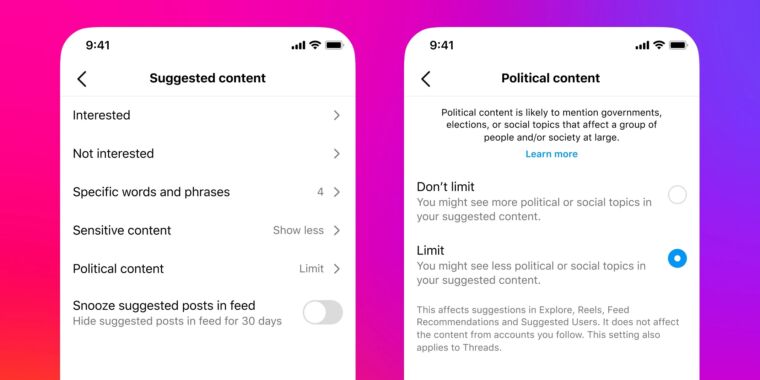Users shocked to find Instagram limits political content by default - 5 minutes read

Instagram users have started complaining on X (formerly Twitter) after discovering that Meta has begun limiting recommended political content by default.
"Did [y'all] know Instagram was actively limiting the reach of political content like this?!" an X user named Olayemi Olurin wrote in an X post with more than 150,000 views as of this writing. "I had no idea 'til I saw this comment and I checked my settings and sho nuff political content was limited."
"Instagram quietly introducing a 'political' content preference and turning on 'limit' by default is insane?" wrote another X user named Matt in a post with nearly 40,000 views.
Instagram apparently did not notify users directly on the platform when this change happened.
Instead, Instagram rolled out the change in February, announcing in a blog that the platform doesn't "want to proactively recommend political content from accounts you don’t follow." That post confirmed that Meta "won’t proactively recommend content about politics on recommendation surfaces across Instagram and Threads," so that those platforms can remain "a great experience for everyone."
"This change does not impact posts from accounts people choose to follow; it impacts what the system recommends, and people can control if they want more," Meta's spokesperson Dani Lever told Ars. "We have been working for years to show people less political content based on what they told us they want, and what posts they told us are political.”
To change the setting, users can navigate to Instagram's menu for "settings and activity" in their profiles, where they can update their "content preferences." On this menu, "political content" is the last item under a list of "suggested content" controls that allow users to set preferences for what content is recommended in their feeds.
Advertisement
There are currently two options for controlling what political content users see. Choosing "don't limit" means "you might see more political or social topics in your suggested content," the app says. By default, all users are set to "limit," which means "you might see less political or social topics."
"This affects suggestions in Explore, Reels, Feed, Recommendations, and Suggested Users," Instagram's settings menu explains. "It does not affect content from accounts you follow. This setting also applies to Threads."
For general Instagram and Threads users, this change primarily limits what content posted can be recommended, but for influencers using professional accounts, the stakes can be higher. The Washington Post reported that news creators were angered by the update, insisting that Meta's update diminished the value of the platform for reaching users not actively seeking political content.
"The whole value-add for social media, for political people, is that you can reach normal people who might not otherwise hear a message that they need to hear, like, abortion is on the ballot in Florida, or voting is happening today,” Keith Edwards, a Democratic political strategist and content creator, told The Post.
Meta's blog noted that "professional accounts on Instagram will be able to use Account Status to check their eligibility to be recommended based on whether they recently posted political content. From Account Status, they can edit or remove recent posts, request a review if they disagree with our decision, or stop posting this type of content for a period of time, in order to be eligible to be recommended again."
Ahead of a major election year, Meta's change could impact political outreach attempting to inform voters. The change also came amid speculation that Meta was "shadowbanning" users posting pro-Palestine content since the start of the Israel-Hamas war, The Markup reported.
Advertisement
"Our investigation found that Instagram heavily demoted nongraphic images of war, deleted captions and hid comments without notification, suppressed hashtags, and limited users’ ability to appeal moderation decisions," The Markup reported.
Meta appears to be interested in shifting away from its reputation as a platform where users expect political content—and misinformation—to thrive. Last year, The Wall Street Journal reported that Meta wanted out of politics and planned to "scale back how much political content it showed users," after criticism over how the platform handled content related to the January 6 Capitol riot.
The decision to limit recommended political content on Instagram and Threads, Meta's blog said, extends Meta's "existing approach to how we treat political content."
"People have told us they want to see less political content, so we have spent the last few years refining our approach on Facebook to reduce the amount of political content—including from politicians’ accounts—you see in Feed, Reels, Watch, Groups You Should Join, and Pages You May Like," Meta wrote in a February blog update.
"As part of this, we aim to avoid making recommendations that could be about politics or political issues, in line with our approach of not recommending certain types of content to those who don’t wish to see it," Meta's blog continued, while at the same time, "preserving your ability to find and interact with political content that’s meaningful to you if that’s what you’re interested in."
While platforms typically update users directly on the platform when terms of services change, that wasn't the case for this update, which simply added new controls for users. That's why many users who prefer to be recommended political content—and apparently missed Meta's announcement and subsequent media coverage—expressed shock to discover that Meta was limiting what they see.
On X, even Instagram users who don’t love seeing political content are currently rallying to raise awareness and share tips on how to update the setting.
"This is actually kinda wild that Instagram defaults everyone to this," one user named Laura wrote. "Obviously political content is toxic but during an election season it’s a little weird to just hide it from everyone?"
Source: Ars Technica
Powered by NewsAPI.org